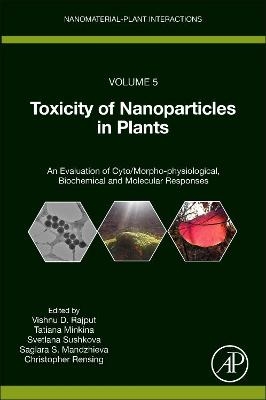
Toxicity of Nanoparticles in Plants
Academic Press Inc (Verlag)
978-0-323-90774-3 (ISBN)
To date, nanotechnology is considered one of the most promising areas of research due to the widespread applications of nanomaterials in plant science and agriculture. However, extensive use of nano-based products raises concerns regarding their toxicity in crop plants, their environmental impact and potential consequences to humans via the food chain.
Dr. Vishnu D. Rajput is a Researcher in the Academy of Biology and Biotechnology, Southern Federal University, Russia. He has 12 years of research experiences in the field of environmental pollution especially on PAHs, priority heavy metals and metallic nanoparticles, and their impacts on plant performance, soil microbial functionalities and plant-microbe-interactions. He earned his doctorate degree from the Chinese Academy of Sciences, Beijing, China. He has published 49 peer reviewed research articles, 1 book and 8 book chapters. Dr. Rajput recently received “Highly Qualified Specialist Status by the Ministry of Internal Affairs of the Russian Federation and Southern Federal University, Russia. Dr. Tatiana Minkina is the Head of Soil Science and Land Evaluation Department of Southern Federal University, Russia. Her areas of scientific interest are soil science, biogeochemistry of trace elements, environmental soil chemistry and soil monitoring. In 2015, she was awarded a Diploma of the Ministry of Education and Science for many years of long-term work for the development and improvement of the educational process and significant contribution to the training of highly qualified specialists. She is a member of the International Committee on Contamination Land; Eurasian Soil Science Societies; the International Committee on Protection of the Environment; and the International Scientific Committee of the International Conferences on Biogeochemistry of Trace Elements. She has 389 scientific publications published in English and is the editor of an Open Access Journal by MDPI “Water. Dr. Svetlana Sushkova is an Associate Professor and Head of the “Ecological Soil Monitoring laboratory, Southern Federal University, Russia. She is also Vice-Director of the International Collaboration of Academy of Biology and Biotechnology at Southern Federal University since 2015. She received an "International and National Recognition" Diploma and “100 young scientists award by Rector, Southern Federal University for years; 2015, 2017, 2018, 2019. She is a leader of several international student & faculty programs such as TUBITAK projects for Turkey, Erasmus+ exchange program for Germany, and the Belt and Road Project for China. Currently, she her main research focuses are nanotoxicity, polycyclic aromatic hydrocarbons contamination, green chemistry, and soil-plant interactions. She has published 100 scientific publications and received 8 patents. Dr Svetlana is also member of the Editorial board Eurasian Journal of Soil Science. Dr. Saglara S. Mandzhieva is a Researcher and Head of the “Monitoring of Biosphere Laboratory of Southern Federal University, Russia. She earned her PhD in Soil Science and is currently researching biogeochemistry of trace elements in soil, environmental soil chemistry, and remediation using physicochemical treatment methods. She has published 354 scientific publications and is a member of the Eurasian Soil Science Societies and the Russian Society of Soil Science. Dr Mandzhieva is a member of various international peer-reviewed journals, including editorial board member of “Minerals. Dr. Christopher Rensing is Distinguished Professor and Director of the Institute of Environmental Microbiology. He was born in Princeton, New Jersey but grew up and studied in Germany. He received his PhD at the Free University in Berlin in 1996. After doing a postdoc with Prof. Barry Rosen at Wayne State University in Detroit, he accepted a faculty position at the University of Arizona in 1999. After promotion to Associate Professor he later accepted a position of Full Professor at the University of Copenhagen in 2012. Finally, he accepted his present position in 2016. The main emphasis of his research is understanding metal-microbe interactions. He has published around 200 peer-reviewed publications with 15,126 citations. He is Associate Editor of Frontiers in Microbiology and Editorial Board member of Applied and Environmental Microbiology.
1. Current Over-view on Production, Application, Releases, and Environmental Risk Associated with Nanomaterials 2. Updated Analysis of the Exposure of Plant to the Nanomaterials 3. Nanomaterial-Plant Interaction: Views on the Pros and Cons 4. Toxicity of Nanoparticles onto Plants: Overview of the Biochemical and Molecular Mechanisms 5. Properties, Particle-Size, Shape, Synthesis, Concentration and Medium Dependent Toxicity of Nanoparticles in Plants 6. Toxic Effects of Nanoparticles under Combined Stress on Plants 7. Effects, Uptake, and Translocation of Cu-based Nanoparticles in Plants 8. Effects, Uptake, and Translocation of Ag-based Nanoparticles in Plants 9. Effects, Uptake and Translocation of Iron (Fe) Based Nanoparticles in Plants 10. Effects, Uptake, Translocation and Toxicity of Ti-based Nanoparticles in Plants 11. Effects, Uptake, and Translocation of Au-based Nanoparticles in Plant 12. Effects, Uptake, and Translocation of Selenium-based Nanoparticles in Plants 13. Bioaccumulation and Biotransformation of Metal-based Nanoparticles in Plants 14. Metal Oxide Nanoparticles Toxicity Testing on Terrestrial Plants 15. Impact on Nutritional Status of Plants Treated with Nanoparticles 16. Techniques Used to Detect the Presence of Nanoparticles in Treated Plant Tissues 17. Current Status and Future Directions for Examining Nanoparticles in Plants
| Erscheinungsdatum | 29.04.2022 |
|---|---|
| Reihe/Serie | Nanomaterial-Plant Interactions |
| Zusatzinfo | 115 illustrations (40 in full color); Illustrations |
| Verlagsort | Oxford |
| Sprache | englisch |
| Maße | 152 x 229 mm |
| Gewicht | 450 g |
| Themenwelt | Naturwissenschaften ► Biologie ► Biochemie |
| Naturwissenschaften ► Biologie ► Botanik | |
| ISBN-10 | 0-323-90774-1 / 0323907741 |
| ISBN-13 | 978-0-323-90774-3 / 9780323907743 |
| Zustand | Neuware |
| Informationen gemäß Produktsicherheitsverordnung (GPSR) | |
| Haben Sie eine Frage zum Produkt? |
aus dem Bereich


